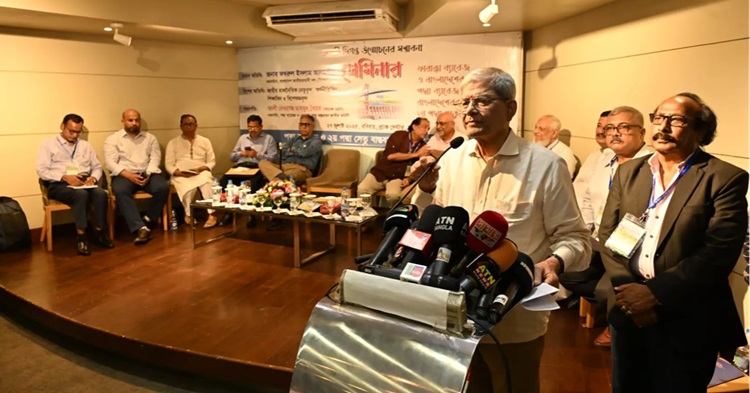People want genuine democracy to solve nation’s problems: Fakhrul


BNP Secretary General Mirza Fakhrul Islam Alamgir on Saturday said that the people of Bangladesh aspire for genuine democracy as it is the only way to resolve the country's problems.
"I can say this that I understand the pulse of my country’s people. They want to improve their lives, they want progress, and they want a genuine democratic system. Through that democratic system, a path to resolving all issues can be found,” he said while addressing a seminar.
Stating that the country is going through a transitional period, Fakhrul urged all to stay united in order to overcome all challenges and achieve success through collective efforts.
“An opportunity has been created as a national unity was built through an unprecedented mass uprising by students and the general public. If we can now move forward with that unity, focus on our core issues, and work with a shared vision and purpose, then without a doubt, we will succeed," he observed.
The BNP leader said the people of Bangladesh have carried out many long democratic struggles and finally achieved independence through a Liberation War, showing their unity and resilience.
“After fighting against fascist forces for the last 15 years, the nation has reached a turning point. In this July and August, we have been able to remove a terrible, monstrous regime. So, if we remain united, I believe success is within our reach,” he said.
These days, Fakhrul said, many people are talking about reforms, but BNP felt the need for reform a long time ago.
He said BNP presented ‘Vision 2030’ in 2016, outlining its reform plans, with Begum Khaleda Zia laying the foundation for the initiative.
In 2022, the BNP leader said their party's Acting Chairman Tarique Rahman had presented 31 points, all focused on reforms.
“As a political party, we are fully aware of what the people need and of the changes that must come with time. We know that reforms are essential, and even changes to the structure of the state are necessary. With this understanding, we are moving forward consciously,” he said.
The National Committee on the Implementation of Padma Barrage and Second Padma Bridge organised the seminar titled, “The Necessity of Implementing Padma Barrage and Second Padma Bridge” at the BRAC Centre Inn in the city’s Mohakhali area.
He said there is no doubt about the need for the Padma Barrage and the second Padma Bridge in Bangladesh. “At the same time, we understand the needs of the people living in the affected districts who have been waiting for these projects.”
Considering the climate situation and its impact on around eight to nine crore people and their lives and livelihoods, Fakhrul said his party fully realises the importance of the Padma Barrage and the second Padma Bridge.
He said although seven feasibility studies have already been carried out and many discussions held, unfortunately, no clear decision has yet been made on the matter.
“Our experts have stressed this point strongly, and I want to highlight it too. What is most needed now is political commitment. Political commitment is the key, and it can only come when the demand arises from the people themselves. This is very important,” the BNP leader said.
He said the Padma Barrage and the Second Padma Bridge are not just issues for Faridpur or Rajbari, as they affect the entire southern region of Bangladesh. “People from all walks of life need to come forward with this demand.”
Fakhrul said BNP Chairperson Khaleda Zia gave a commitment to build the Second Padma Bridge a long time ago.
Noted economist Dr Debapriya Bhattacharya said an updated technical report on the Padma Barrage and Second Padma Bridge projects is necessary before moving forward with such major infrastructure.
He said political commitment is also needed to implement such large projects in a transparent manner.
Dr Debapriya also said political parties should include river protection as part of their election pledges and reflect it in their election manifestos.
He said Bangladesh must also prepare to reassess and renegotiate the Ganges Water Sharing Treaty with India, which is set to expire in 2026 after completing its 30-year term.
Eminent economist and former adviser to the caretaker government Dr Hossain Zillur Rahman said a competent and courageous political leadership is required to implement such a project, considering its potential, along with an updated technical report.
He said technical expertise, transparency and skilled professionals for regional negotiation are also necessary to carry out the Padma Barrage and Second Padma Bridge projects.
Hossain Zillur suggested forming a working group on the Padma Barrage project to create public pressure on the government for its implementation.
Water resources and climate change expert Dr Ainun Nishat said building the Second Padma Bridge is possible, but it will be a very risky undertaking and must be approached with caution.
He said it is important to understand how the river will behave in the proposed locations of the second bridge over the mighty Padma River.
The expert said environmental concerns should also be taken into account when planning such major bridge and barrage projects.
Dr Nishat expressed concern that people in the southern region of Bangladesh are already facing serious consequences of climate change and said the government should take the issue seriously.
